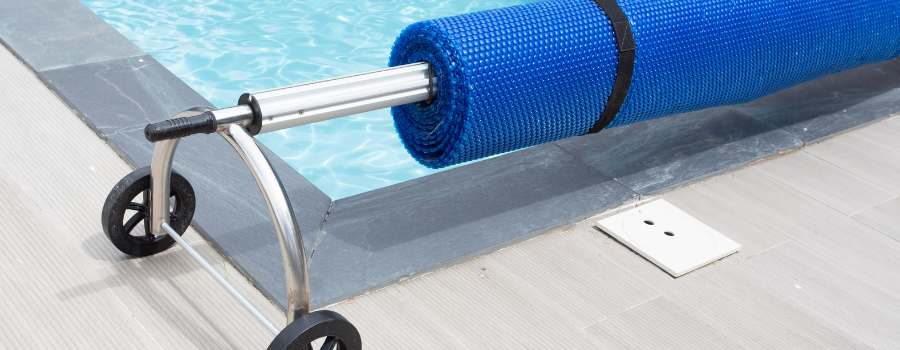A solar pool cover is a great way to keep your swimming pool clean and reduce evaporation. But with so many different thicknesses available, which one is right for you? In this blog post, we will compare the thicknesses of solar pool covers and help you decide which one is best for your needs.
In general, the thickness of a solar pool cover matters in that thinner covers are lighter and easier to cut or trim to fit your pool while thicker covers won’t be blown around by the wind or be susceptible to the elements.
When it comes to solar pool cover thickness, there is no one-size-fits-all solution. The best solar pool cover for you will depend on the size of your pool, the type of solar energy capture you want to achieve, and your budget.

What thickness pool solar cover is best?
In general, thinner solar pool covers (8 mil) may be a better choice for smaller pools that don’t need as much protection or heat retention. On the other hand, thicker solar pool covers (12 to 16 mil) are generally more durable and provide better insulation and solar energy capture.
Generally speaking, solar pool covers are available in a range of thicknesses. Thinner solar pool covers are usually made out of a lighter material, such as polyethylene or bubble-wrap style material, while thicker solar pool covers may be made from reinforced plastic or rubber.
Consider opting for a thicker solar pool cover if you’re looking for an all-round solution that provides excellent protection and solar energy capture. Thicker solar pool covers are also more resistant to tears and other damage.
Another reason many people opt for a thicker solar pool cover is to prevent strong winds from blowing them around the pool or even off your property.
What Are Some Pros To Thinner Solar Pool Covers?
- Less expensive (usually)
- Easy to cut and trim
- Easier to maneuver
- Easier to fold and store
Do Thicker Solar Covers Work Better?
Thicker solar pool covers are generally better at capturing solar energy and reducing evaporation. They also tend to be more durable and resistant to tears. However, if you have a small pool that doesn’t need as much protection or heat retention, thinner solar covers may be the better choice for you.
Ultimately, the best solar pool cover for you will depend on your individual needs. Consider the size of your pool, the solar energy capture you wish to achieve, and your budget when deciding which solar pool cover thickness is the best choice for your swimming pool.
What Are Some Pros To Thicker Solar Pool Covers?
- More durable
- Longer lasting
- More effective solar energy capture
- Reduced evaporation rate
- Stand up to stronger winds
Why Is Solar Pool Cover Thickness Important?
The solar pool cover thickness you choose is important because it determines how effective the solar pool cover will be at capturing solar energy and reducing evaporation. Thicker solar pool covers are generally better at absorbing solar energy, as well as providing extra protection and durability.
No matter which solar pool cover thickness you decide to go with, you can be sure you’re doing your part to reduce pool evaporation and energy loss. Plus, solar pool covers provide a great way to save money over the long term!
So while there is no single solar pool cover thickness that is right for everyone, understanding the differences between solar pool cover thicknesses will help you make the best decision for your pool.
What Is The Best Material For A Solar Pool Cover?
The best solar pool cover material is one that offers the right balance of protection and solar energy capture. Polyethylene solar covers are lightweight and affordable, making them a popular choice for many swimming pools. However, for more durable solar pool covers, you may want to consider reinforced plastic or rubber solar covers.
Rubber and plastic solar pool cover materials can provide excellent solar energy capture and protection, but they may be more expensive than other solar cover materials.
Pros of Polyethylene Solar Pool Covers:
- Lightweight
- Affordable
- Easy to handle and store
Pros of Reinforced Plastic or Rubber Solar Pool Covers:
- Durable and tear resistant
- Excellent solar energy capture
- Provide extra protection for the swimming pool
What Can Happen If I Don’t Use A Solar Pool Cover?
Without a solar pool cover, you may experience increased evaporation and energy loss. This can lead to higher energy bills, as well as having to replace the water in your swimming pool more often. In addition, solar pool covers provide extra protection against debris and other contaminants that could otherwise enter the pool and disrupt its balance.
So while solar pool cover thickness shouldn’t be the only factor you consider when selecting a solar pool cover, it is an important one. Having the right solar pool cover thickness can help ensure that your solar pool cover provides the protection and solar energy capture you need.

